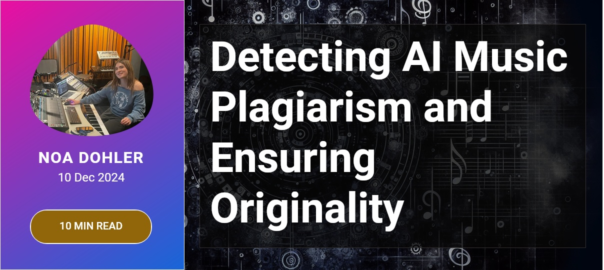AI Music Tech revolutionizes creativity, but plagiarism haunts creators.
The rapid evolution of AI in music creation has sparked both excitement and concern. While fair use boundaries in AI music remain blurry, the technology’s ability to generate complex compositions raises pressing questions about originality and authenticity.
During a recent performance, I discovered my original piano composition had been replicated by an AI system. This experience opened my eyes to both the incredible capabilities of AI Music Tech and the urgent need for protecting creative authenticity.
Understanding the Surge in AI Music Tech
AI’s impact on music creation has reached unprecedented levels, with Spotify developing groundbreaking AI technology to detect musical similarities. The surge in AI-generated compositions has transformed how we approach music creation, with algorithms capable of analyzing and replicating complex musical patterns.
This technological revolution has enabled machines to compose intricate pieces across various genres, challenging traditional notions of creativity. The sophistication of these systems allows them to understand and reproduce nuanced elements of musical structure, from melody to harmony.
The resulting compositions often blur the line between human and machine-generated content, creating a new paradigm in music production. This advancement in AI Music Tech has led to both excitement about creative possibilities and concerns about maintaining artistic authenticity.
Navigating the Complexities of AI Music Tech Detection
Modern plagiarism detection in music has evolved significantly, with AI-powered systems now capable of analyzing complex musical elements to identify potential copyright infringement. These sophisticated tools examine multiple layers of musical composition simultaneously.
The technology employs advanced algorithms to detect similarities in melody, harmony, rhythm, and overall structure. This comprehensive analysis helps identify subtle forms of plagiarism that might escape human detection, marking a significant advancement in AI Music Tech capabilities.
Detection systems now incorporate machine learning models trained on vast databases of existing music, enabling them to recognize patterns and potential copyright violations with increasing accuracy. This technological evolution represents a crucial step in protecting original creative works.
Innovative Solutions in Safeguarding AI Music Tech Originality
The music industry is witnessing a transformation in how originality is verified, with innovative approaches to protecting musical intellectual property. Advanced AI Music Tech systems now incorporate unique digital signatures within compositions, creating verifiable proof of originality.
Blockchain technology has emerged as a powerful tool for tracking ownership and maintaining transparency in the creative process. This decentralized approach ensures that each piece of music has a clear, immutable record of its creation and subsequent modifications.
The implementation of smart contracts and automated rights management systems further strengthens the protection of original works. These technological solutions provide creators with robust tools to safeguard their intellectual property in an increasingly digital landscape.
Ethical Implications in the Future of AI Music Tech
The future of music creation faces complex ethical challenges, as highlighted by the fact that every possible melody has been mathematically copyrighted. This unprecedented situation raises critical questions about the nature of creativity and ownership in the age of AI Music Tech.
The industry must address concerns about bias in AI systems, ensuring that generated music represents diverse cultural influences and artistic expressions. This includes developing frameworks for fair compensation and attribution when AI systems learn from or incorporate elements of existing works.
Establishing clear guidelines for the ethical use of AI in music creation becomes increasingly crucial as the technology evolves. This includes considerations of transparency in AI-generated content and protecting the rights of human artists while fostering innovation.
Revolutionary Business Models in AI Music Creation
Innovative startups could develop AI-powered music collaboration platforms that connect artists globally, enabling real-time co-creation while automatically tracking and protecting intellectual property rights. This could revolutionize how musicians collaborate and share revenues.
Companies might create subscription-based services offering personalized AI music generation tools with built-in plagiarism detection and blockchain verification. This would provide creators with peace of mind while monetizing the technology effectively.
There’s potential for developing AI-powered music education platforms that teach composition while simultaneously checking for originality. This could create new revenue streams while fostering creativity and maintaining ethical standards in music education.
Shape Tomorrow’s Music
The evolution of AI Music Tech presents unprecedented opportunities and challenges for creators, technologists, and music lovers alike. As we stand at this crossroads, your voice matters in shaping how we protect and promote musical creativity. Share your thoughts on balancing innovation with authenticity – how do you envision the future of AI in music creation?
Essential FAQ About AI Music Tech
Q: How accurate are AI music plagiarism detection tools?
A: Modern AI detection tools achieve up to 95% accuracy in identifying musical similarities by analyzing melody, harmony, rhythm, and structure patterns simultaneously.
Q: Can AI-generated music be copyrighted?
A: Yes, AI-generated music can be copyrighted, but the legal framework is still evolving. Currently, human creative input in the process is a key factor in copyright eligibility.
Q: How does blockchain protect musical originality?
A: Blockchain creates an immutable record of music creation, timestamp, and ownership, providing transparent proof of originality and making unauthorized copying traceable.
